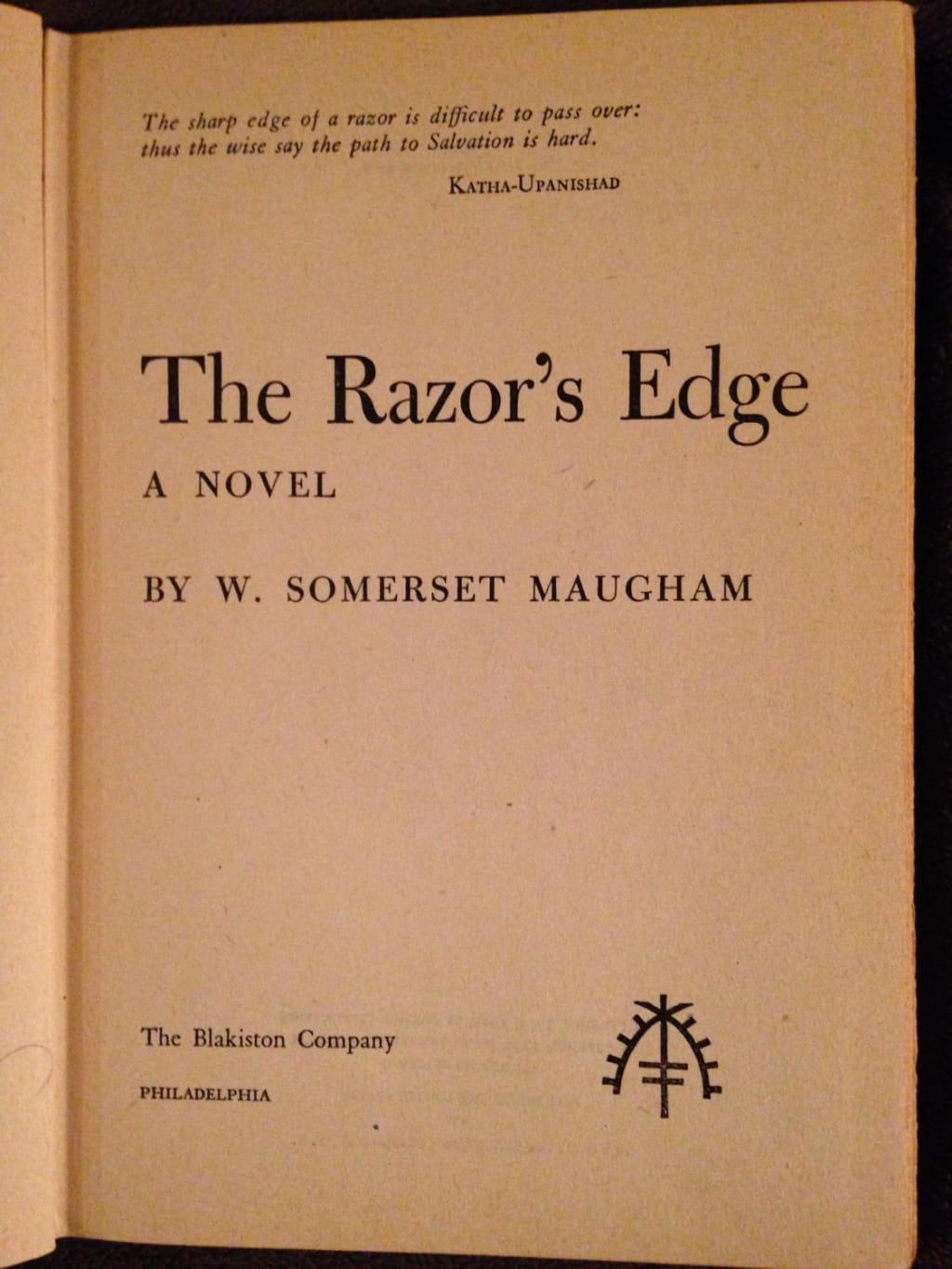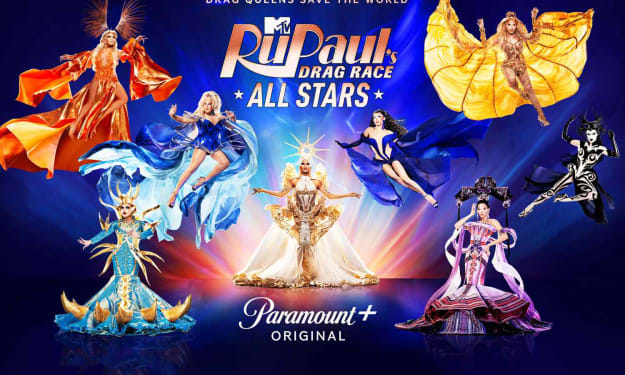Experiencing 'The Razor's Edge'
A Reflection

There are several reasons why one would want to pick up a book. The first could be the title, the second the cover design, and the third, the first of those printed words captured your attention. But the combination of all three entices you to buy that book. To take it home and read it, only based on the knowledge you have from that first look.
The first chapter of my experience with the novel The Razor's Edge, by W. Somerset Maugham begins in a GOODWILL. A stack of vintage bound five-dollar books the height of one of my friends sat clustered next to the front register. A little blue book with aged pages, and a small gold symbol edged onto the front cover caught my eye. I observed it. I inspected the spine to uncover the title and author, as well as feeling the soft parchment between my fingers. With no summary provided, I opened it to the first chapter: the very first sentence, a first-person telling by the author filled with comedy and philosophic tragedy. I was hooked, paid the five dollars, and attempted to read more while I sat in the backseat of my friends' car, and we all drove about the dark San Francisco streets. I was enthralled, but because of my studies, I had to set it aside.
The book became one of my summer reads. I had just come off a fast-paced book, so at first, it was difficult to tell if I was making progress, even though this book was shorter than the previous. While the story of The Razor's Edge held little actual plot, and took place over several decades, the characters make up for the lack of narrative action. Set predominantly in Paris, the novel centers around the Author's retelling of his experiences with a traumatized WWI veteran, Larry, and the wealthy family with whom he is connected. In essence, the story chronicles Larry's journey of enlightenment as he, in his words, "loafs" about, learning more about philosophy, psychology, and spirituality through his journeys through Europe to India, and back again. The author also frequently encounters the family of Larry's previous fiancé, Isabel, and how they react to Larry's behavior, providing the antithesis to Larry's journey. They were born into wealth, losing it all in the Great Depression, then found a way to maintain their lavish and self-indulgent lifestyles.
Isabel remains obsessed even after she chooses to marry one of her wealthy suitors, Gray, and is characterized to be as cold and cruel as she is beautiful. Her uncle Elliot is described as a classic snob, and is obsessed with status. He even had a church built in his name, and flaunts a family crest to gain importance. I thought he was coded as gay based on his flamboyant behavior, which makes him all the more interesting when you take into account his obsession with the Catholic Church. While the author is friends with Elliot, he knows Elliot is not necessarily friends with him, because of his nature. The author's inside experience to the journeys of these people become more interesting when a childhood friend of Larry's appears in Paris. Sophie is the most intriguing and tragic of all the figures in this book. She, like Larry, came from an impoverished background, and was a shy poet in her youth. She went on to marry the love of her life and had a baby. But when Larry reunites with her, she is not the woman he or anyone else remembers. She is disheveled, an alcoholic, and an opium addict. Also, her "boyfriend" provides an implied context to her night job. It turns out her husband and child were killed in a drunk driving accident, and she never overcame her grief. Larry tries to help her recover from her addictions, and even prepares to marry her, but she relapses. It turns out, Isabel purposefully tempted Sophie with alcohol to make her relapse and break off her engagement with Larry. Tragically, even when Larry tries to find her and help her, Sophie returns to her previous lifestyle, and is murdered not long afterward.
The introduction of Sophie is the primary source of drama and conflict for the characters, and it tests Larry's resolve in his enlightenment.
I had an adventure reading this book, and would rant to my mother when something questionable, confusing, or shocking arose in the book. Mostly I complained I was having a hard time getting through the book, because of its pacing and tangents. For example, by the end of the book, Larry and the author sit down and talk about Larry's philosophy, and explain his enlightenment. While this is fantastic and very interesting, it isn't precisely titular to the book. Even the writer tells the reader that they can skip a few pages if they wanted. But being the stubborn person I am, I still read it. There are a few uncomfortable parts of the story that are brushed off as no big deal. For example, while Larry is working as a farmhand during his travels, he suspects the young wife of his boss is sexually attracted to him. Of course, he tries to fend off her advances, even as his farm hand companion tells him to go with it. Then one night, someone climbs into his bed, and makes aggressive advances on him. He can't see who they are, and he is not interested in having sex. But Larry is too afraid to say no, because he is worried it is the wife, and that she will get him fired if he refuses. He comes to realize it was his boss's daughter instead, and leaves the farm early in the morning in fear of trouble. I don't think I need to explain that non-consensual sex is a big no for me in books. Therefore, you can understand why I would be upset that this situation happened to the lead character.
Another odd thing was how often the author lingered and obsessed over Isabel's looks. She starts as a plump young adult who he thinks is attractive, but he fixates on her weight. The author criticizes everyone in this book who is overweight. Then, when he meets Isabel again, and finds her thin, he is amazed, and regularly discusses her beauty. The only contrasting he provides is that her looks, while attractive, still cannot erase that she is cold, cruel, and lacking in genuine affection for others. There is also a part where he extorts her to kiss him if he gives her the information she wants.
Overall, I enjoyed the book for exploring different perspectives, religions, and philosophy, and how others cope with society, and the trauma life has dealt them. It's for the most part, respectful to the different concepts it discusses, and what I found most surprising was that the Christian faith was not the conclusion for Larry. And the way he rejects different religious lifestyles is very graceful. When he meets a Monk and tries to see if his religion and way of life was for him, he discovers he doesn't feel the fulfillment he wants. But he does not shame the Monk, and the Monk does not shame him, and encourages Larry to find his true path. The whole book works well as a kind of adult coming of age story.
When I found out the book has twice been made into a movie, I immediately wanted to see how the film was adapted. Since the version made in 1984, starring Bill Murray was not free on streaming, I opted to watch the 1946 adaptation. From the standpoint of an adaptation, it is very book accurate, and while some characters are omitted for time and relevancy, it is clear they wanted to focus on the major players: the author, Larry, Isabel, Grey, Elliot, and Sophie. I enjoyed the film even with its inaccuracies. I also thought the acting was great, even with its bits of melodrama, so I highly recommend you check it out. There was only one thing that I disliked in the film, and it was how Larry found his enlightenment in India, and its representation. It was described in a very Christian way, and barely resembled the religion described in the book. In fact, in the book, it would hardly be defined as a religion. The only explanation I could gather as to why this was changed was because of Hollywood censorship at the time. Also, the fact that explaining it in the book took so long, and they didn't want to bother explaining something very complicated to its audience.
What I took away from this piece as a writer is that I could have little to no plot, and still tell a compelling story that deals with complex ideas and concepts. There were so many ideas, and quotes I loved in this book, and some have integrated into my perspectives on life. Like Larry, I'm seeing what works for me.
What I took away from this book as a person is that there are many ways you can live your life. No one should judge how you decide to find meaning in it. The author dislikes finding fulfillment in material wealth like money, clothing, and status, and displays that they are unfulfilling in the end. But the author also knows not all of us can be Larry, and we all have the potential to be Sophie, because that is part of being human. We have to live with who we are in the end, and we only have to recognize that we must search for our own fulfillment. It will not be easily handed to us.






Comments
There are no comments for this story
Be the first to respond and start the conversation.